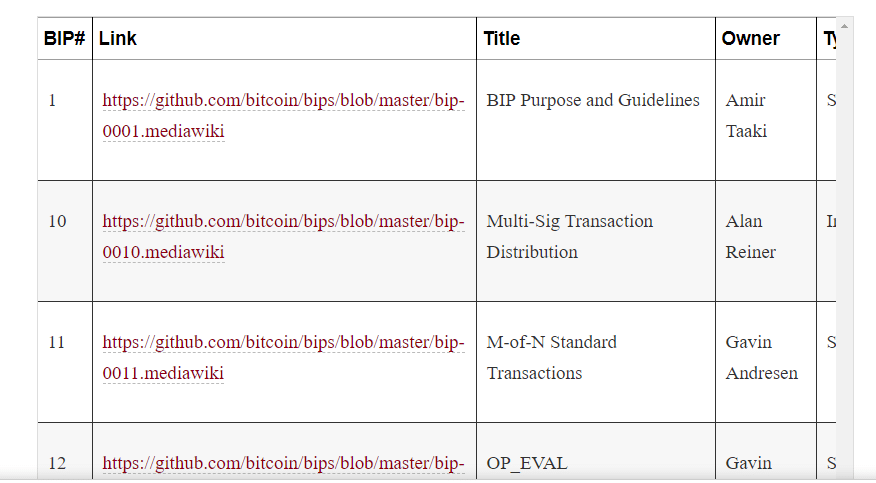Bitcoin has come a long way to become the most celebrated and traded cryptocurrency. But as you may already know, it’s still grappling with many issues the major ones being scalability and privacy. When the concept of digital currencies started to make sense, some high-level programmers began to develop other cryptocurrencies (altcoins) with a few issues that Bitcoin was facing in order to topple it from the top position. Unfortunately, none of them has achieved that dream yet.
As the top and most cherished cryptocurrency, Bitcoin has been able to gain the support of many proponents. Thanks to its ever-expanding population (and the inherent need to stay on top of the game), the currency now has to reinvent itself in order to remain relevant to its users. Changes to the bitcoin network are introduced through Bitcoin Improvement Proposal. These will help bitcoin in its evolution as a payment method. – Visit the official website here.
IMAGE: PIXABAY
Bitcoin improvement proposals (abbreviated BIPs) are documents forwarded to the Bitcoin fraternity by blockchain and cryptocurrency experts to inform or propose some improvements, design issues or any other information about the Bitcoin ecosystem. BIPs come in the following three classifications.
Standard BIP
This is a proposal whose effects touch on the core parts of the Bitcoin network. Examples of such a proposal include a change in transaction validity rules, block alteration or a shift in the network protocol. The community must vote to approve or disapprove Standard BIPs.
Informational BIPs
These carry advice on Bitcoin design issues or any other problem in the ecosystem. Informational BIPs don’t propose a new feature rather they make recommendations which users and implementers can choose to consider or ignore.
Process BIP
Process BIP recommends a change in various processes but not to Bitcoin’s source code. The BIP is more of an intermediate between standard and Informational BIP. Unlike the latter, a process BIP commands the attention of the members (consensus) and thus not worth ignoring. Examples of these BIPs are a shift in the decision-making process or a change in tools or Bitcoin environment.
Three Major Bitcoin Improvement Proposal
As a Bitcoin enthusiast, trader or programmer, it’s vital to know some of the changes the community members have raised before through BIPs. This can help you suggest something better (by building on the previous recommendations) or just get the hang of the major improvements that have happened within this space. Now, without further digressing, here are the most common BIPs you need to know:
1. Confidential Transactions
Presented by Gregory Maxwell, this proposal aims to introduce a new level of privacy that will see details such as transaction amount and wallet addresses obfuscated. Before SegWit implementation, enabling confidential transactions would have necessitated a hard fork. Thankfully, since the upgrade, minors can now implement the code successfully via a soft fork.
CT came to life through the introduction of a cryptographic tool known as Pedersen Commitment. The tool masks the values in a transaction thus making everything anonymous to the prying eyes of the public.
Confidential Transactions will elevate Bitcoin’s status to a fully private-centric cryptocurrency and hence able to compete with other similar cryptocurrencies. Monero, Zcash and several others have gained enormously from their privacy as digital currency users don’t want to be traced by anyone including government agencies.
2. M.A.S.T
M.A.S.T is an abbreviation of Merkelized Abstract Syntax Trees. This proposal, like CT, is a work in progress and was documented by three BIPs, i.e. BIP 114, 116, and 117. M.A.S.T represents two algorithms; Merkle Tree, and obviously Abstract Syntax Trees. These two, when combined, will help to include complex data (like smart contracts) to a transaction-related data on the BTC blockchain.
It might be a little clearer if we take a look at the purpose of each algorithm. Merkle Tree provides a way to record data without the need to download it for confirmation. This means time and space saved. The Abstract Syntax Trees, on the other hand, divides and labels data into their respective sets.
Now, when the two algorithms come together, it becomes easier to add complex data on the BTC blockchain. Once implemented, Merkelized scripts will not only make it possible to add sophisticated data to a transaction on the blockchain but will enhance privacy and transaction speed as well.
3. The Lightning Network
Albeit not directly a BIP, It’s extremely hard to ignore the impressive promises the Lightning Network has put forth. But since it’s a sidechain solution to the core BTC blockchain, it still qualifies to be considered a BIP.
The Lightning Network is a proposal that will introduce the execution of most transaction off the main chain thus giving it more time to handle vital transactions. When everything is done on the core blockchain, it becomes overtaxed, and minors start charging more in order to prioritize transactions. Consequently, the network becomes slow-which is something Bitcoin is getting known for.
So, if you have an arrangement with someone that involves several transactions, all of them will be handled through secure and trustless user-generated channels that send the Bitcoins back and forth. These micro-transactions will not be broadcasted to the main chain. Only the final details like the amount of BTC transacted, and the number of parties involved would be recorded to the main blockchain.
The lightning Technology will not only speed the transaction on the Bitcoin blockchain but will significantly cut down on mining fees(or make them non-existential) as well. The proposal was put forward by Joseph Poon and Thaddeus Dryja and can only come to pass once BIP 112 gets approved as it contains a code that will make it run smoothly.
Bottom Line
Major Blockchain decisions are implemented through a consensus voting. While this type of democracy is admirable, there have been clashes where miners downvote a proposal they deem less useful to them and which is believed to benefit those who propose them. Additionally, some BIPs promise a lot and after implementation, they deliver very little. These are some of the issues bottlenecking the progress of Bitcoin.
Nevertheless, major upgrades can and will only happen if various Bitcoin Improvement Proposals are approved. At the moment, this cryptocurrency has achieved many milestones, and more will come through the upcoming BIPs.
BIPs aim to introduce new features to the bitcoin protocol.
If you are interested in even more business-related articles and information from us here at Bit Rebels then we have a lot to choose from.




COMMENTS